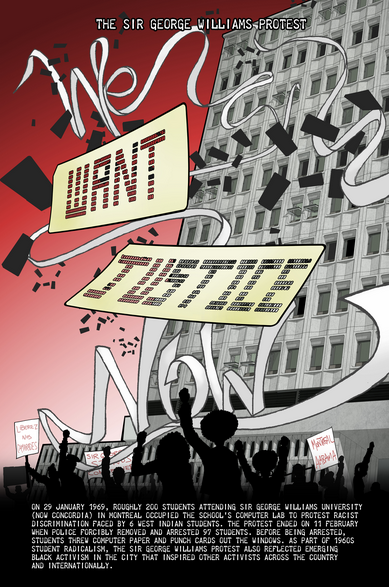From the Graphic History Collective
 Poster by Lateef Martin
Poster by Lateef Martin
Essay by Funké Aladejebi
On 29 January 1969, roughly 200 university students barricaded themselves in the Computer Centre on the ninth floor of the Henry F. Hall Building at Sir George Williams University (now Concordia University) in Montreal, Quebec. The standoff was part of a two-week occupation to protest racial discrimination that culminated in riot police forcibly removing and arresting protesters from the building on 11 February 1969. By the time the Sir George Williams protest—often referred to as an “affair” or “riot”—ended, police had arrested 97 people, including both white and black students, and the university had undergone $1 million dollars’ worth of damage. The protest and its aftermath shattered ideas of racial harmony in Canada, and the event remains the country’s largest student occupation.
Students originally organized the protest in response to allegations of racism and discrimination by biology professor Perry Anderson. In Spring 1968, six black Caribbean students accused Anderson of awarding them lower grades than their white colleagues for comparable work. At the time, university administrators had limited measures in place for dealing with allegations of racial discrimination. After a quick hearing and short deliberation, administrators rejected the complaints, and Anderson resumed his position. To demonstrate their dissatisfaction with the outcome, students held a peaceful sit-in inside the Hall Building. Things quickly turned violent, though. After someone set fire to the computer lab, the police sought to maintain control and end the student occupation.
After the protest, tensions remained high in Montreal. Residents were divided about the motivations and implications of student militancy in the city. On the one hand, the Royal Canadian Mounted Police and city officials denounced the protest as the work of leftists and foreign student radicals. Though several of the student protesters arrested were white, many people viewed the protest as a result of black radicalism seeping into Canada from the United States. On the other hand, the protest galvanized Montreal’s diverse black Canadian population. They responded to the increased criticism and scrutiny of their communities by developing local and transnational organizations that advocated for educational reform and challenged systemic discrimination in various Canadian social institutions. In the wake of the occupation and arrests, black Canadians established such groups as the Coalition of Black People of Quebec and the National Coalition of Black Canada, and local black community newspapers like Uhuru, to combat racial discrimination and exclusion within Quebec and across Canada.
While the Sir George Williams protest was part of the growing student activist movements and critiques that occurred in 1960s Canada, it was unique in its demonstration of black militancy across the country. It indicated a particular kind of black student protest that disrupted the national narrative of racial equality and peace. Much of the discourse in Canada at the time around racial inequity was rooted in criticisms of the United States. The Sir George Williams protest ruptured the façade of Canadian innocence and became part of a longer radical shift in black Canadian organizing that occurred in the late 1960s and included such events as the Congress of Black Writers, a four-day conference held at McGill University in October 1968.
Emphasizing a growing international focus on black radical action, the Sir George Williams protest exposed the shared experience of racialization and racism across the African diaspora and included Canada in this global phenomenon. The students who participated in the protest demonstrated a shift in black radical activism and organizing and the urgent need for political, economic, and social equality for racial minorities in Canada.
Download – The Sir George Williams Protest (PDF)
Posters are free to download for personal, educational, and activist use. See how you can use and support these posters. If you want to exhibit or publish the posters please get in touch.


